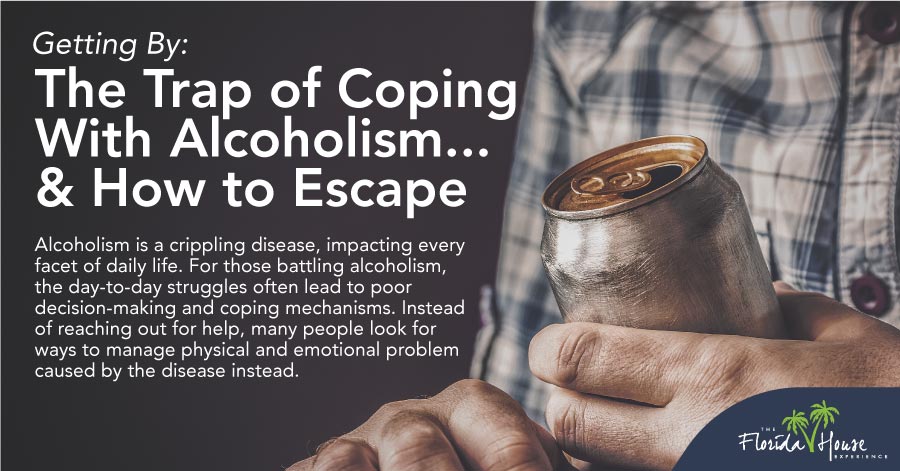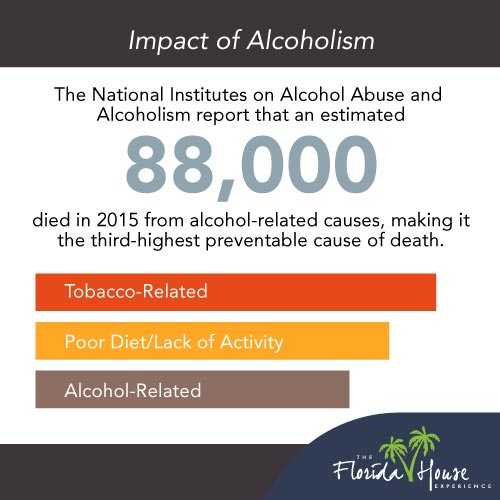
Alcoholism is a crippling disease, impacting every facet of daily life. For those battling alcoholism, the day-to-day struggles often lead to poor decision-making and coping mechanisms. Instead of reaching out for help, many people look for ways to manage physical and emotional problem caused by the disease instead. With online communities offering ongoing support and sometimes encouragement, it can seem okay to continue to drink.
But a lifestyle of coping is no way to live. If you or your loved one is struggling with alcoholism, it’s time to seek out help from a treatment program. At FHE Health, solutions exist to help you to stop dealing with the side effects and instead rebuild your life.
Living a Life of Coping
A middle-aged man, perhaps living a typical life, spends most days drinking. He admits to taking a day off from drinking perhaps once every other week. Some days are rough, but most include from eight to 12 drinks a day.
Throughout his day, he struggles with an uncomfortable feeling in his gut. He spends some time worrying about it but thinks it’s just a symptom of his admitted alcoholism. It’s true, he knows he drinks too much and has a disease, but instead of reaching out to the community for help with it, he turns to a group online to get advice on dealing with his gut pain.
Despite realizing the pain is likely due to his drinking habits, he never stops drinking or sees that as an option. Rather, he wants to know what he can do to stop the pain. He’s living a coping lifestyle at the hands of alcoholism.
Alcoholism Paralyzes Many with Limited Options
 Having a drink or two a day may seem okay, but living a lifestyle of heavy drinking is rarely okay from a health and addiction standpoint. Having an alcohol use disorder — a chronic brain disease in which a person cannot stop or control their alcohol use even when it’s harming them — can be life-threatening. The National Institutes on Alcohol Abuse and Alcoholism report that an estimated 88,000 people died in 2015 from alcohol-related causes, making it the third-highest preventable cause of death.
Having a drink or two a day may seem okay, but living a lifestyle of heavy drinking is rarely okay from a health and addiction standpoint. Having an alcohol use disorder — a chronic brain disease in which a person cannot stop or control their alcohol use even when it’s harming them — can be life-threatening. The National Institutes on Alcohol Abuse and Alcoholism report that an estimated 88,000 people died in 2015 from alcohol-related causes, making it the third-highest preventable cause of death.
When people struggle with alcoholism, they aren’t able to make rational decisions about when to get help. Some believe they will always remain alcoholics and even blame their genes. They don’t recognize that treatment can give them another chance, or they may be unwilling to stop drinking.
This is where a lifestyle of coping occurs. Instead of seeking a solution for the alcoholism, they look for ways to get through their day. Like the man with the gut pain, it’s all about avoiding the real problem.
How Communities Like Reddit Fuel ‘Solutions’
 Communities like Reddit and other open forums create opportunities for people to share and gather insight without any real consequences. No one knows who you are, who your family is or what your true condition is. You can ask questions, comment and make even the most ridiculous statements, and there are no consequences to doing so. For many, this means there’s a source of support, encouragement and help available that will offer help without judging.
Communities like Reddit and other open forums create opportunities for people to share and gather insight without any real consequences. No one knows who you are, who your family is or what your true condition is. You can ask questions, comment and make even the most ridiculous statements, and there are no consequences to doing so. For many, this means there’s a source of support, encouragement and help available that will offer help without judging.
In the case of the man with the gut pain, he received some good advice about the condition and how to get help. He learned that his drinking habits would likely make the condition a bit worse to treat but that he could still get help. No one told him to stop drinking, and many recognized that it was his choice to live as he would like to.
By using these communities to gather insight, individuals can try to resolve health problems on their own, sidestepping the real help they need from doctors. That can create a high health risk and an easy way to avoid addressing the underlying problem of alcoholism. Having access to such a wide variety of communities can be a danger in another way. If you are engaged in an unhealthy behavior and are unwilling to change, you will very likely find other like-minded people online to band together with. This behavior can reinforce each other and make you more steadfast in your resistance.
Emotional Support for Problems
These communities may seem like beneficial places that provide emotional support and understanding. Visitors are able to find tips and strategies for drinking while avoiding treatment for underlying conditions like depression. Instead of helping the person, they end up enabling the continued use of alcohol.
For example, a young girl admits to drinking to get through the day after the death of a family member. She binge drinks but still struggles to hold down a job and is judged by her friends for continuing to drink. Supportive commenters in the community try to cheer her up, but no one suggests not drinking or getting help for the cause of her grief and depression.
How a Community Could Help a Person Dealing with Alcoholism – A Better Resource
A similar style of community could be used to provide real help. A person fearful of their health or emotional state could open up freely but also receive the encouragement they need to get into treatment or to a specialist. Instead of providing “solutions” to medical problems, members could encourage a person to go to a treatment center for help.
There are numerous community groups for those struggling with alcoholism. Some are hard to find; others don’t attract those who are truly suffering from alcoholism because they don’t want to be told to stop using. Those with alcoholism need support and encouragement to seek proper treatment. Such a community could make it possible for them.
Getting Help for Alcoholism at FHE Health
At the FHE Health, comprehensive alcoholism treatment is available. Through an approach to detoxing and both inpatient and outpatient care, people can regain control over their lives and build a successful future. True care comes from a licensed treatment center. Seek out help for your needs from an organization that can help you stop coping and start living again.






